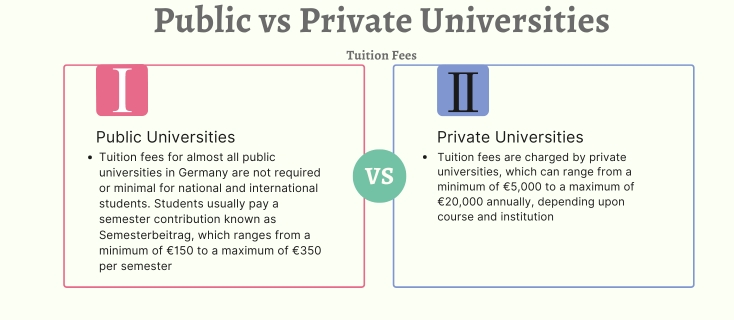Plan for higher studies in Germany and have no idea which one to prefer. Public vs Private Universities in Germany: Which One to choose in Germany is the most general question every International Student asks. Such decisions can be very critical in nature, hence their telling influence on your academic career, financial implications, and even future job prospects. In this comprehensive guide, we shall look at crucial differences between public and private universities in Germany with the help of data and insights that will help you in making a very important decision.
By considering all these points you will get an idea of which type of university will be best suited for you.
Overview of German Higher Education System: Public vs Private Universities
Germany boasts a robust higher education system with over 400 institutions, including universities, universities of applied sciences (Fachhochschulen), and colleges of art, film, and music. These institutions are categorised into public and private universities in Germany.
- Public Universities: Funded and managed by the federal states (Länder), these institutions constitute the majority of universities in Germany. Approximately 95% of students in Germany are enrolled in public universities.
- Private Universities: These are funded by tuition fees, donations, and private organisations. Although they represent a smaller percentage of institutions, they are gaining popularity, especially among international students.
Tuition Fees: Public vs Private Universities In Germany

The greatest motivator for choosing between private and public would have to be the cost of education.
- Public Universities: Tuition fees for almost all public universities in Germany are not required or minimal for national and international students. Students usually pay a semester contribution known as Semesterbeitrag, which ranges from a minimum of €150 to a maximum of €350 per semester. This kind of contribution may include an administrative component, public transport, and student services. According to the DAAD (German Academic Exchange Service), students living in Germany incur average living costs of about €850 to €1,000 a month for rent, food, insurance, and other purposes.
- Private Universities: Tuition fees are charged by private universities, which can range from a minimum of €5,000 to a maximum of €20,000 annually, depending upon course and institution. These fees reflect the personalized attention, smaller class sizes, and additional services that private institutions often provide. However, this cost is generally too high for most students, particularly those from countries with currencies that are weak against the Dollar. In addition, some private universities offer financial aid and scholarships; however, they are greatly limited compared to public higher-learning institutions.
Also Read: Fees for Btech in Germany for Indian Students
Quality of Education: Public vs Private Universities
The quality is high at both public and private universities in Germany, but the approach and resources differ.
- Public Universities: Most German public universities are research-oriented, especially in engineering, natural sciences, and humanities. They pride themselves on a wide array of course offerings and strong ties with research institutions and industries. Most of them owe their existence to the “Excellence Initiative” by the German government, aiming to grow top research. Thus, universities like Ludwig Maximilian University of Munich, the University of Heidelberg, and the Technical University of Munich managed to get their ranking among the best in the world one after another.
- Private universities: Most private universities are practically oriented, offering industry-based courses in Business, Management, and social sciences. It might also signify smaller class sizes, closer interaction with professors, and more pragmatic learning. Some of the private ones have very good accreditation in their business courses, such as WHU – Otto Beisheim School of Management and ESMT Berlin, which also have good links with the industries for great networking.
Admission Chances: Public vs Private Universities
The admission criteria between public and private universities are highly different, enabling the institutions to admit or reject applicants depending on the required qualifications for their respective programs.
- Public Universities: Public universities are highly competitive, especially in the popular programs. Admission normally requires a high school diploma, Abitur, or its equivalent, proof of proficiency in the German language for German language programs, and in many cases, further tests and/or interviews. Foreign students are less frequently admitted due to this fact.
- Private Universities: Private universities are generally more flexible in terms of enrollment criteria and, therefore, more prepared to take into consideration various qualifications and experiences of applicants. They also tend to focus more on motivation letters, interviews, and work experience than public universities do. This may be beneficial for those students who don’t fit into the rigid criteria necessary to enroll in a public university but would nevertheless be able to function well there
Class Size and Learning Environment: Public vs Private Universities
The learning environment and class size can be very different between a public and a private university.
Public Universities: Classes are generally larger in public institutions and even more so at the undergraduate level. A direct consequence, of course, is that classes tend to become impersonal due to this factor since a student would have little personal contact with professors. However, public universities have better-established student organizations and support services in which one can get assistance to see him through his studies.
Private Universities: Generally, classes in private universities are small, and professors are therefore in a position to pay more attention to their students. On the other hand, this may mean that the student body is somewhat intimate. Learning can then become rather more interactive and engaging; thus, students have ample opportunity to take active parts in class discussions and in projects.
Facilities on Campus and Available Resources:Public vs Private Universities
The quality and availability of campus facilities will also impact your decision on whether to go to a public or private university.
- Public Universities: German public universities tend to have massive infrastructures with amenities such as libraries, research labs, sports facilities, and halls of residence. These facilities are sometimes overused due to a high intake of students to the extent that libraries may be fully packed; there may be a long waiting list for certain services.
- Private Universities: Normally, private universities invest a lot in state-of-the-art classrooms and modern facilities. They may provide more comfortable and modern amenities such as fully computer-equipped labs, modern lecture halls, and well-managed student hostels.
Employment and Career Opportunities: Public vs Private Universities in Germany
The choice between Public and Private can impact individual future career opportunities, especiallyin terms of networking and industry connections.
- Public Universities: Employers in certain professional settings place an exceptionally high value on the graduate from a public institution in Germany. The great attention to research, as well as theoretical knowledge in studying, prepares one for entering academia, research institutions, and government agencies. Similarly, many public universities are in partnerships with leading companies or organizations where they provide students with the possibility to intern and work during and after their studies.
- Private Universities: Many private universities have firm employability and practical skills commitments. Generally, they are more industrially connected and offer programs that are directly linked with current job market demand. Graduates from private institutions may hold slight advantages in the job market, especially in business, finance, and management sectors, considering that during their time they could achieve networking and industry linkages.
International Student Experience: Public vs Private Universities
Germany is a top destination for international students, and the experience can vary depending on whether you choose a public or private university.
- Public Universities: Public universities in Germany are very popular among international students due to their relatively affordable tuition and high prestige. Most of the public universities offer English-speaking programs, especially at the master’s level, so even students who don’t speak any German will benefit from them. However, the bureaucracy and larger campus environment could be complex to navigate for international students without German skills.
- Private universities – Private universities tend to be more international-friendly, with more programs in English and additional service offers that include language courses, cultural integration, and personal academic consulting. This can make the environment friendlier, easier to navigate for the students, and by this means easier to adapt to a new life in Germany.
Top 18 Universities: Public vs Private Universities in Germany
In Germany, more than 300 are public Universities, and over 100 are private universities.
Following are the names of some globally ranked universities, ranking amongst the top universities in the country
| Public Universities | Private Universities |
| Technical University of Munich (TUM) | WHU – Otto Beisheim School of Management |
| Ludwig Maximilian University of Muncih (LMU) | ESMT Berlin |
| RWTH Aachen University | Jacobs University Bremen |
| Heidelberg University | Frankfurt School of Finance and Management |
| Free University of Berlin | SRH Berlin University of Applied Sciences |
| Humboldt University of Berlin | GISMA Business School |
| Karlsruhe Institute of Technology (KIT) | Munich Business School |
| University of Stuttgart | Hertie School of Governance |
| University of Mannheim | International University of Applied Science (IU) |
Conclusion
The choice between a public and private university in Germany will depend on academic goals, financial status, and personal preference. In this case, while public universities will provide world-class education with minimal tuition fees, attracting students looking for a research-oriented experience, private universities will offer a more personalised industry-focused education that might bring wider networking opportunities and a wide variety of career support.
Ultimately, the very best decision will fall to what you value most in your educational experience. You can make an informed decision by considering all these factors of this guide and concerning your long-term goals. Whichever route you take, Successcribe is right behind you while you achieve your academic and career objectives in Germany.
Related Post
Accommodation in Germany
MSC in Cyber Security in Germany
How to Get Scholarship to Study Abroad
BBA in Germany Requirements













